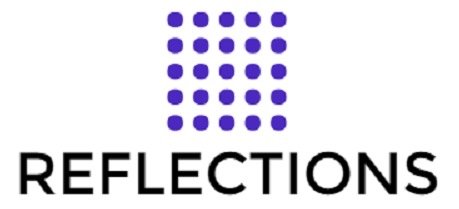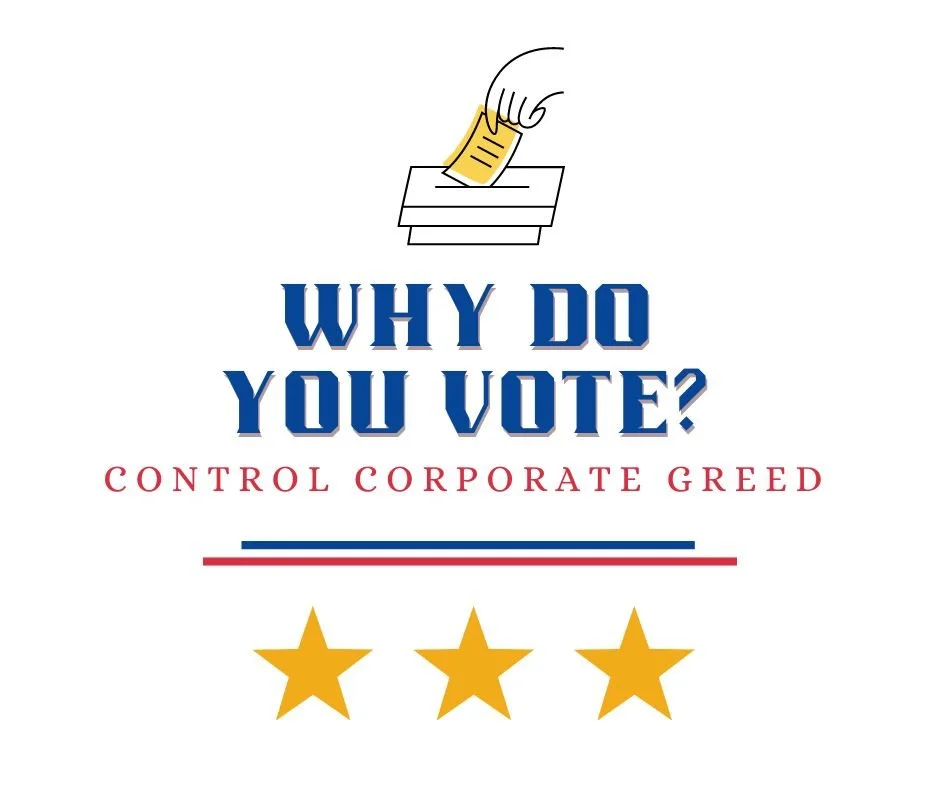Why Do You Vote? Control Corporate Greed
As a retired physician currently being treated for multiple myeloma, Dr. Karen Ilika has seen the impact the pharmaceutical industry has had on the cost of medical treatment as a result of relentless price increases and aggressive lobbying. Large corporations of all kinds also wield enormous influence in our elections due to the landmark Citizen’s United decision by the U.S. Supreme Court, which eliminated the controls previously placed on their role. Her stories are posted below for your consideration in deciding how to vote in November. You can read additional comments from Dr. Ilika on her Facebook page: http://facebook.com/karen.ilika.
End Outrageous Drug Prices
Why I Vote by Dr. Karen Ilika
71 days to the General Election
I vote to decrease the power of Big Pharma and to protect consumers from price gouging.
I first became aware of Rep. Katie Porter in May of 2021. She was on an oversight committee in Congress and on this particular day she was featured on the news grilling the head of the pharmaceutical company that manufactures Revlimid. She sat with her white board and attached circles proportionate to the costs for R&D, advertising and marketing, shareholder returns, profits, etc. Then she asked questions about how a medication that cost $215 per pill in 2005 had increased to $763 per pill without any additional investment in research, modifications, studies, etc. In fact much of the money required for clinical trials and other initial costs was provided by tax-payer funded grants. As it turned out the executives of Calgene were rewarded on the basis of profit. Revlimid represented 60% of their business so the easiest way to increase profit was to raise the price on this one drug each year to meet their targets. The normal course of business in a capitalistic society or price gouging?
Little did I know at the time that in precisely one year I would be diagnosed with multiple myeloma and have this exact drug prescribed with a monthly supply costing in the neighborhood of $23,000 today. I have an excellent insurance plan that is provided by the government and so is paid for by taxpayers. Fortunately my co-pay for this and other expensive medications is affordable for me. (Thank you taxpayers, but you’ve been taken advantage of.)
By way of contrast, both Jonas Salk and Albert Sabin who pioneered polio vaccines gave their inventions to the public to keep the valuable medicine affordable. They were heroes. This was a huge boon in my childhood when polio vaccines were widely distributed through the elementary schools.
The government spent $216 billion on prescription medications for Medicare beneficiaries in 2021. The government has been prohibited from negotiating the prices since 2003 when George W Bush signed a law that explicitly prohibited Medicare from negotiating prices as part of a deal made with the pharmaceutical industry. The political power of “Big Pharma” is jaw-dropping.
Congressional lawmakers of both parties were the recipients of donations totaling $13 million in the last presidential election. Over 2400 politicians at the state level also received donations. In addition, many lawmakers are stockholders, some with millions of dollars invested. Conflict of interest?
Finally, after many years of gridlock, the Biden-Harris administrations passed the “Inflation Reduction Act” and things have changed. One of the provisions of the Act allows the negotiation of some drug prices for Medicare. Most countries currently pay less than half of what US taxpayers are charged. There will eventually be 20 drugs that will not be subject to the 2003 prohibition, with 10 of the most expensive and commonly prescribed drugs coming on line next year. This process allows the government to act like a savvy consumer and get a fair deal. Taxpayers will benefit from a projected savings of nearly $100 billion over the next decade. Notably not a single Republican in Congress voted for the Inflation Reduction Act and Kamala Harris had to cast the deciding vote in the Senate. (Read that sentence again.)
Protect Consumers and the Environment from Corporate Money and Lobbyists
Why I Vote by Dr. Karen Ilika
69 days to General Election
I vote to have lobbyists (and congressmen) behave in ways that are ethical and advance the interests of citizen constituents.
When I was in practice there was a lot of discussion about the ethics of interacting with representatives of the drug companies. I guess they could be considered comparable to the lobbyists for the medical industry. Drug reps would come to my office to leave some samples that I could provide for patients, usually oral contraceptives, hormonal preparations or medications for vaginal issues that were typical for a gynecology practice. Others brought samples of prenatal vitamins and formula for the OB patients. If there was a new drug coming on the market, they had literature and would sometimes bring pizza and answer questions over lunch.
Obviously, there is a need for physicians to be educated about new or alternative products. The most common way to learn about these is from reading professional journals, talking to the drug reps and attending meetings where clinical trials are presented in lecture format or on posters in a large convention hall. It’s no exaggeration to say that to keep up with all the new products and medical advances is an immense time commitment.
In the generation of doctors before me, Big Pharma provided junkets to fancy golf getaways and other perks to woo doctors to prescribe their products. By the 80’s there was an awareness that questioned whether accepting a pizza while listening to a presentation on a new contraceptive pill was compromising our objectivity. I never felt it did, and really, how many prescriptions could I possibly write for their products anyway? This, of course, pales in comparison to the Congressional lobbyists and campaign contributions to the lawmakers who wield the power to make or break a company. One of the largest lobbying groups represents the gas and oil industry.
In 2022 the industry spent over $124 million lobbying federal lawmakers. The legislative issues that were top of the list included methane emissions, drilling on federal land in coastal waters, and subsidies for carbon capture. The oil companies that spent the most on lobbying also were the top emitters of greenhouse gases (methane). Their opposition to climate change legislation was demonstrated by political contributions primarily to Republicans who are climate change deniers.
In 2022, the Inflation Reduction Act, which contained a large climate spending package, was the bill most lobbied. In some “horse trading” Senator Joe Manchin negotiated a provision requiring gas and oil companies to have a shot at offshore drilling leases before wind and solar projects were offered permits. His vote was critical to pass the entire bill so compromises were made. Senator Manchin, who has family ties to the coal industry, has received nearly one million dollars over the past 5 years from the gas and oil companies. That would buy a lot of pizzas.
Sadly, a Congresswoman from my own state introduced a bill that would require the government to issue additional leases for drilling on federal land and in our waters any time the Strategic Petroleum Reserve was used. The Energy and Commerce committee that she chairs has worked on several bills to reverse parts of the Inflation Reduction Act. Her spokesman said “No contribution Cathy receives influences how she votes or her actions in Congress.” She received nearly $400,000 in political donations from gas and oil during the 2022 midterm election season alone. There is at least the appearance of being influenced.
Of course, lobbyists are expected to educate lawmakers on their industry and their agenda. It just seems suspect that the size of their political contributions seems to correlate with the influence of the recipient and their eventual votes. A phrase that comes to mind is “follow the money.”
I will vote for ethical conduct on the part of elected representatives and the lobbyists with whom they collaborate.
Keep Corporate Money Out of Elections
Why I Vote by Dr. Karen Ilika
68 days to the General Election
Lest I become too dismayed about the power of money in our elections, while making my small donations to favored candidates, I am looking for groups with the organization to push things back in the other direction, pre-Citizens United.
The League of Women Voters has this to say about money in politics:
In 2010, the landmark ruling in Citizens United v. Federal Election Commission reversed longstanding campaign finance restrictions, allowing corporations and other outside groups to supply unlimited election funding to the candidate of their choice. This opened the floodgates, allowing big money and special interests to overwhelm our elections. Since then, super PACs and a small number of wealthy individuals have gained disproportionate influence over our elections, making politicians beholden to the needs of special interest groups and large donors rather than the priorities and interests of their own constituents. We work to ensure that our government serves the people, not wealthy special interests, by promoting transparency, limiting SuperPACs, and eliminating dark money.
See more at: https://www.lwv.org/
The Brennan Center for Justice at New York University of Law, has this to say:
The campaign finance system is broken. Super PACs and shadowy nonprofits give enormous sway to the super-wealthy and big corporations. The Brennan Center is working to build a better system, pushing for public financing that matches small donations with public money, and regulations to eliminate illegal foreign spending. And we are waging a long-term fight to overturn misguided Supreme Court rulings that weaken crucial protections.
See more at: https://www.brennancenter.org/
There are established groups that recognize the problems with our current campaign finance laws and offer education, advocacy and suggestions on how each of us can participate in the solution. We can find out about legislation that’s in the pipeline and make plans to let our representatives know that we are paying attention and are interested in the outcome. Make some noise.
I will vote and use my voice in concert with others who are also working towards a system of truly representative government. I vote and realize that there is power in community.

